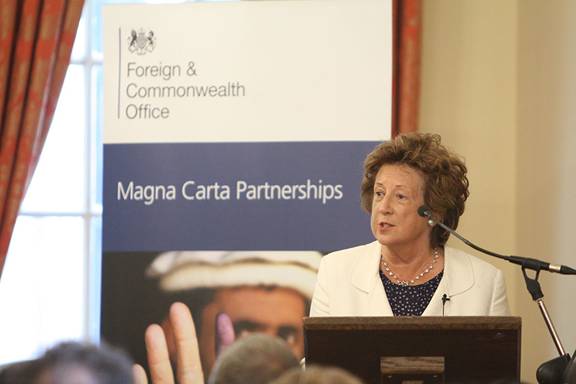17th September 2015 London, UK
International Democracy Day and Launch of Magna Carta Partnerships

On UN International Democracy Day 2015, I was delighted to host an event to launch the FCO’s first human rights initiative of this Parliament: Magna Carta Partnerships, a new agile fund to deploy British legal and parliamentary expertise to help reinvigorate global support for democracy and rule of law.
In this 800th anniversary of the sealing of the Magna Carta, it was particularly poignant to celebrate International Day of Democracy at Gray’s Inn, which sits at the very heart of the UK’s legal tradition. The first references to the Inn’s existence date back to 1370, roughly coinciding with the amendment of a clause in the Magna Carta that introduced the phrase “due process of law”. This was a pivotal moment in British legal history, and our understanding of democracy, based on the rule of law today.
As one of our expert panel, Sir Jeffrey Jowell, Director of the Bingham Centre for the Rule of Law, put it: “It is important and innovative that this initiative links the trilogy of democracy, human rights and the rule of law. Democracy looks largely to the instruments of law making and political accountability; human rights to the limits of the law and government action; but… it is the rule of law that provides the critical step towards the practical implementation [of human rights]”.
We were also honoured to have on our panel the Chief Executive of the Westminster Foundation for Democracy, Anthony Smith, and our former Deputy Ambassador to Egypt, Thom Reilly, who witnessed the Arab Spring from Cairo in 2011.
Freedom House’s 2014 report suggests that global “freedom” declined for an eighth consecutive year, so I was particularly struck by Anthony’s words that the core democratic challenge remains to curb, constrain and control the power of the executive. It was heartening to hear, however, that there is an encouraging appetite from countries around the world for WFD to share lessons about Britain’s experiences in democratic governance.
It was also fascinating to hear of Thom Reilly’s experiences in the aftermath of the 2011 “Revolution” in Egypt, and the lessons he had learnt about the role of a diplomat at such times of upheaval: to be the critical friend. He also talked about the best ways of communicating such messages: “megaphone” diplomacy could be absolutely counterproductive.
Following the event, I went to the House of Lords in order to be held accountable to our own Parliament, answering questions on the elections in Turkey and Burma. I also reflected further on the nature of democracy, and how it often involves incremental change. For example, in 1370, as a woman, I could not even have entered Gray’s Inn. However, 600 years later I am able to chair an event in one of its finest rooms, having passed, on my way in, a portrait of The Right Honourable Baroness Hale of Richmond – the most senior female judge in British history.
I am hopeful that countries around the world will not have to wait a similar length of time to enjoy the benefits of democracy. By working in a spirit of international partnership, we can bring change, and make the seemingly impossible, possible.